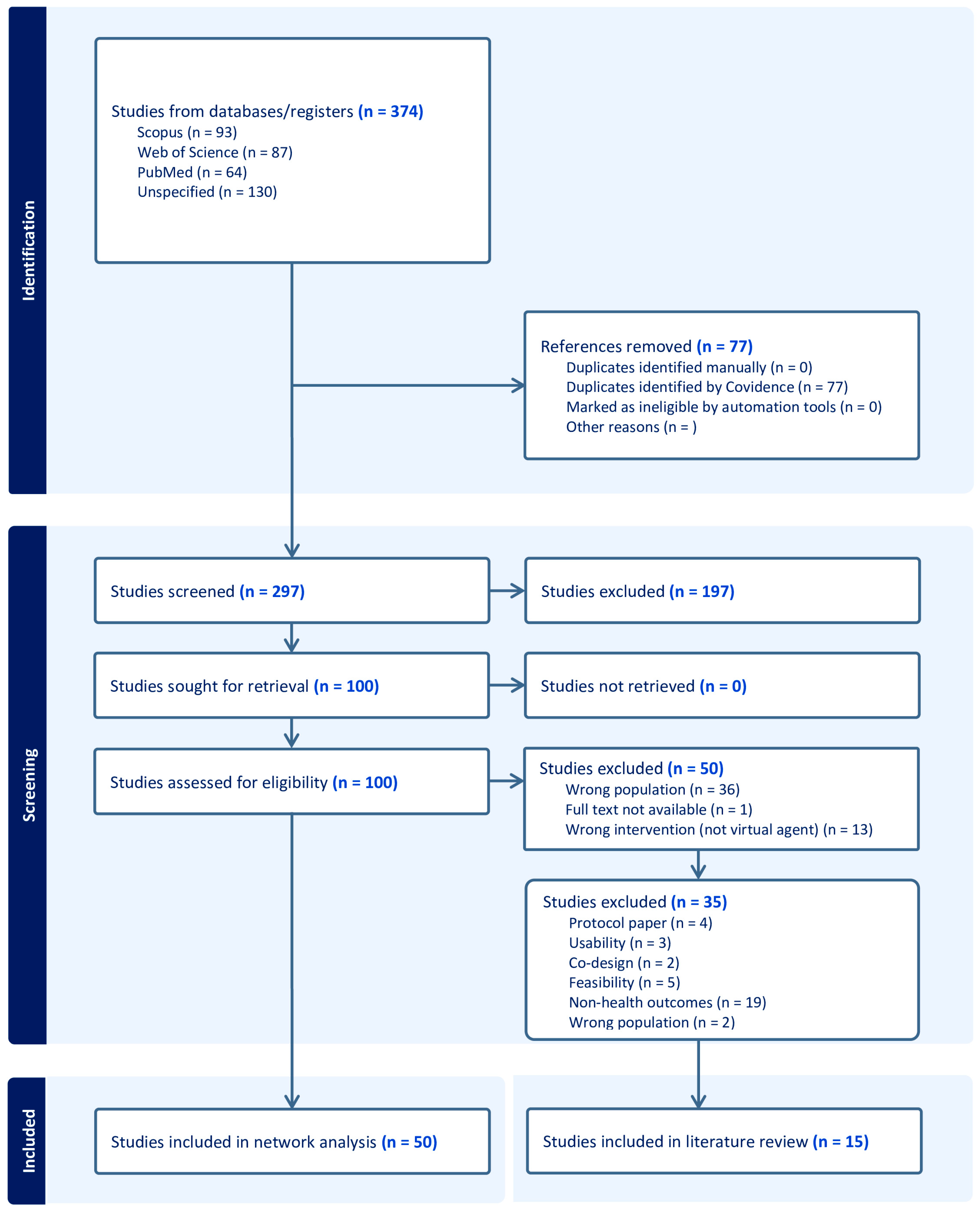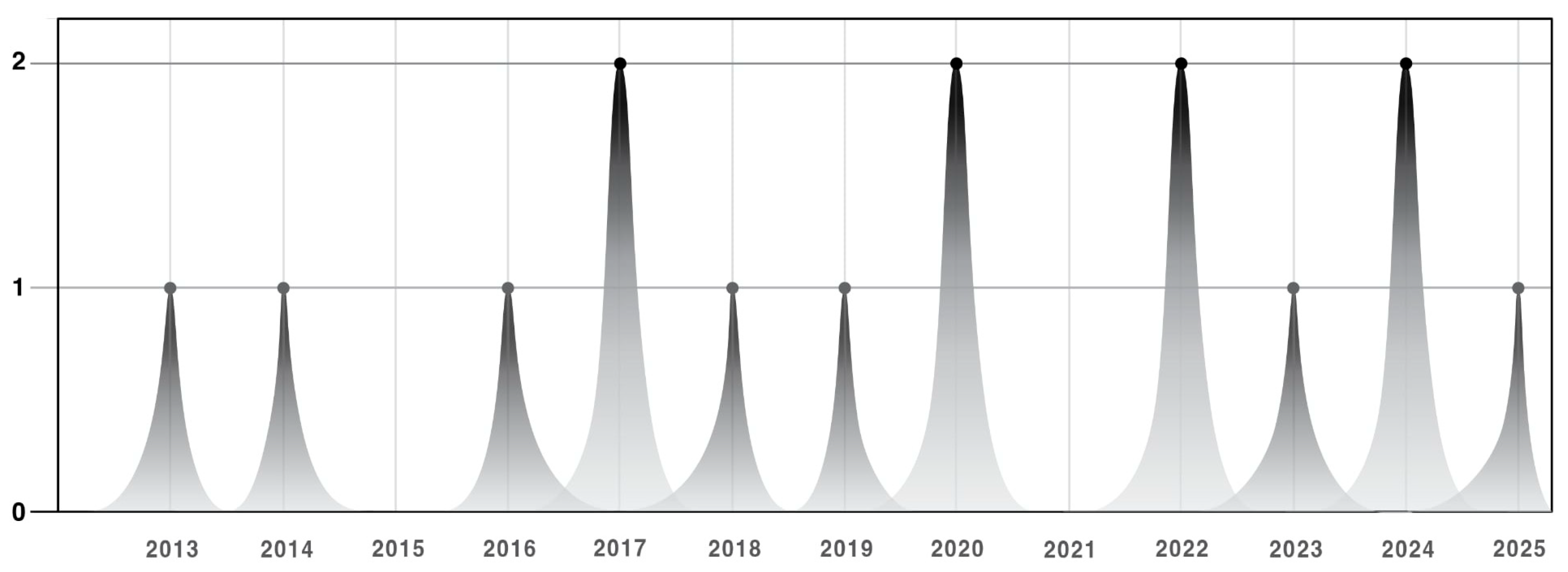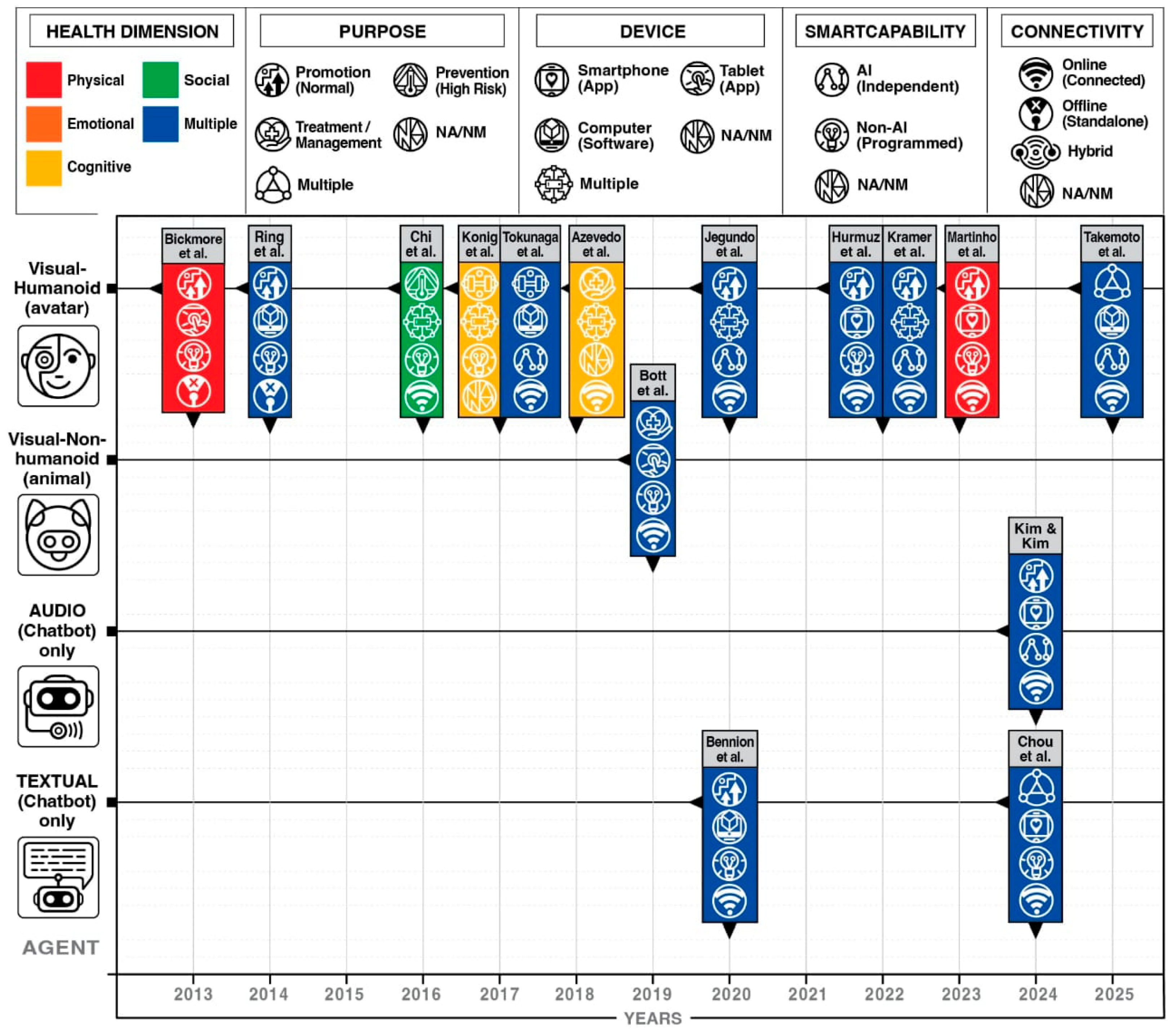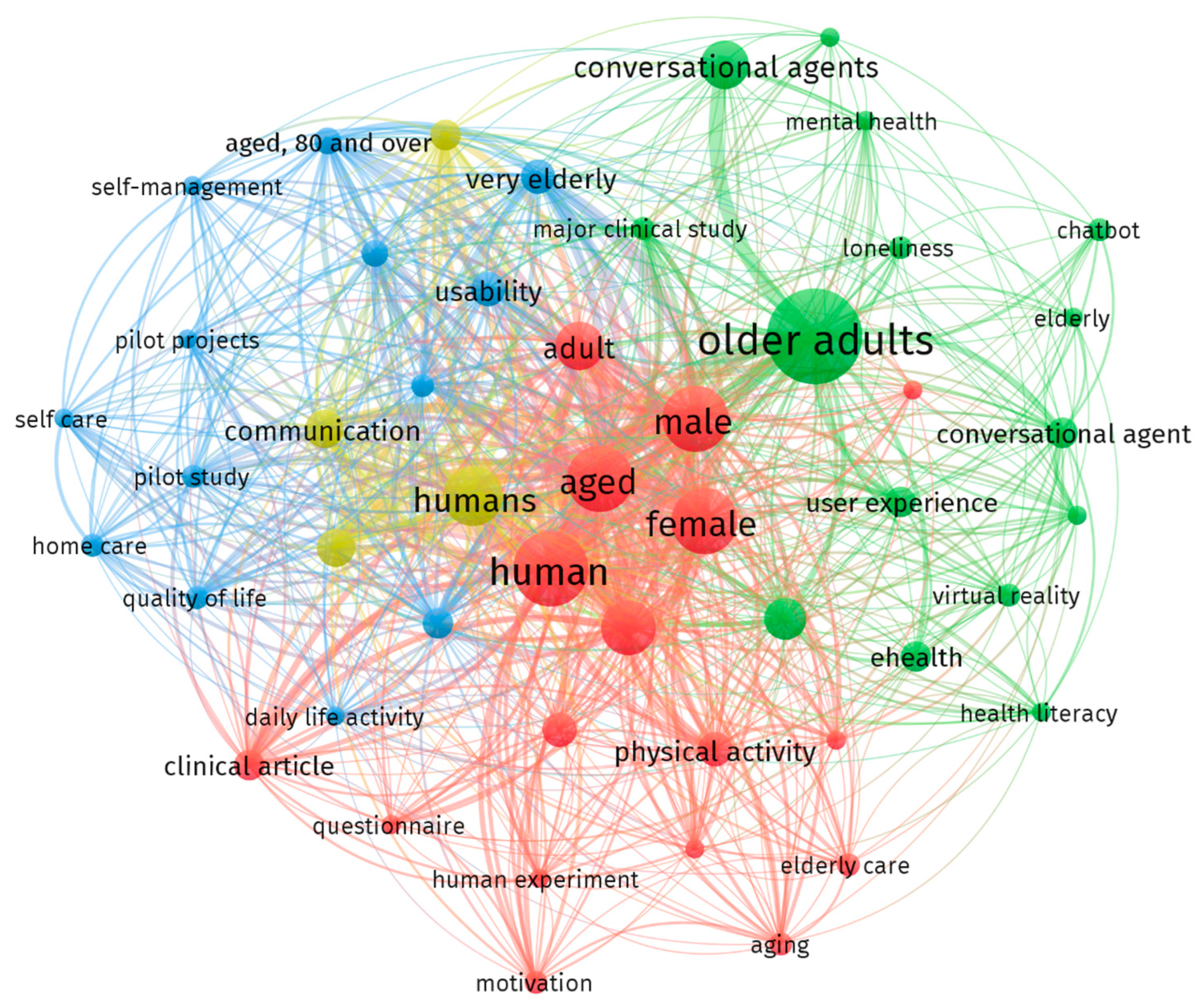Remote Virtual Interactive Agents for Older Adults: Exploring Its Science via Network Analysis and Systematic Review
Abstract
1. Introduction
2. Materials and Methods
2.1. Stage 1: Problem Identification
2.2. Stage 2: Literature Search
2.3. Stage 3: Data Evaluation
2.4. Stage 4: Data Analysis
2.5. Stage 5: Presentation
3. Results
3.1. Bibliometrics
3.2. Article Purpose and Outcomes
3.3. Health Dimensions and Technology Characteristics of Virtual Interactive Agents for Older Adults
3.4. Network Analysis–Keyword Co-Occurrence and Topic Clusters
4. Discussion
4.1. Bibliometrics
4.2. Article Purpose and Outcomes
4.3. Health Dimensions and Technology Characteristics of Virtual Interactive Agents for Older Adults
4.4. Network Analysis–Keyword Co-Occurrence and Topic Clusters
5. Study Limitations
6. Conclusions
Supplementary Materials
Author Contributions
Funding
Institutional Review Board Statement
Informed Consent Statement
Data Availability Statement
Acknowledgments
Conflicts of Interest
Abbreviations
| VIA | Virtual Interactive Agent |
| MMAT | Mixed Method Appraisal Tool |
References
- Jaul, E.; Barron, J. Age-Related Diseases and Clinical and Public Health Implications for the 85 Years Old and Over Population. Front. Public Health 2017, 5, 335. [Google Scholar] [CrossRef]
- World Health Organization. Ageing: Global Population. Available online: https://www.who.int/news-room/questions-and-answers/item/population-ageing (accessed on 2 June 2025).
- Rees, P. Demography. In International Encyclopedia of Human Geography; Elsevier: Amsterdam, The Netherlands, 2009; pp. 75–90. ISBN 978-0-08-044910-4. [Google Scholar]
- World Health Organization. Ageing and Health. Available online: https://www.who.int/news-room/fact-sheets/detail/ageing-and-health (accessed on 2 June 2025).
- Jones, C.H.; Dolsten, M. Healthcare on the Brink: Navigating the Challenges of an Aging Society in the United States. npj Aging 2024, 10, 22. [Google Scholar] [CrossRef]
- Kotsani, M.; Kravvariti, E.; Avgerinou, C.; Panagiotakis, S.; Bograkou Tzanetakou, K.; Antoniadou, E.; Karamanof, G.; Karampeazis, A.; Koutsouri, A.; Panagiotopoulou, K.; et al. The Relevance and Added Value of Geriatric Medicine (GM): Introducing GM to Non-Geriatricians. J. Clin. Med. 2021, 10, 3018. [Google Scholar] [CrossRef]
- World Health Organization. Mental Health of Older Adults. Available online: https://www.who.int/news-room/fact-sheets/detail/mental-health-of-older-adults (accessed on 2 June 2025).
- Noto, S. Perspectives on Aging and Quality of Life. Healthcare 2023, 11, 2131. [Google Scholar] [CrossRef] [PubMed]
- Dino, M.J.; Vital, J.C.; Patricio, C.; Catajan, M.W.; Ong, I.; Gallardo, A.; Macaspac, R.; De Vera, O.; Santos, F.; Agustin, P.D.; et al. Charting the Uncharted: Mapping Scientific Publications on Online Disinhibition Effect in the Digital Space via Bibliometrics and Network Analyses. Comput. Hum. Behav. Rep. 2023, 12, 100336. [Google Scholar] [CrossRef]
- Stoumpos, A.I.; Kitsios, F.; Talias, M.A. Digital Transformation in Healthcare: Technology Acceptance and Its Applications. Int. J. Environ. Res. Public Health 2023, 20, 3407. [Google Scholar] [CrossRef] [PubMed]
- La Valle, C.; Johnston, E.; Tager-Flusberg, H. A Systematic Review of the Use of Telehealth to Facilitate a Diagnosis for Children with Developmental Concerns. Res. Dev. Disabil. 2022, 127, 104269. [Google Scholar] [CrossRef]
- Bogoslov, I.A.; Corman, S.; Lungu, A.E. Perspectives on Artificial Intelligence Adoption for European Union Elderly in the Context of Digital Skills Development. Sustainability 2024, 16, 4579. [Google Scholar] [CrossRef]
- Shaked, N.A. Avatars and Virtual Agents—Relationship Interfaces for the Elderly. Healthc. Technol. Lett. 2017, 4, 83–87. [Google Scholar] [CrossRef]
- Kyrlitsias, C.; Michael-Grigoriou, D. Social Interaction with Agents and Avatars in Immersive Virtual Environments: A Survey. Front. Virtual Real. 2022, 2, 786665. [Google Scholar] [CrossRef]
- Whittemore, R.; Knafl, K. The Integrative Review: Updated Methodology. J. Adv. Nurs. 2005, 52, 546–553. [Google Scholar] [CrossRef]
- Bott, N.; Wexler, S.; Drury, L.; Pollak, C.; Wang, V.; Scher, K.; Narducci, S. A Protocol-Driven, Bedside Digital Conversational Agent to Support Nurse Teams and Mitigate Risks of Hospitalization in Older Adults: Case Control Pre-Post Study. J. Med. Internet Res. 2019, 21, e13440. [Google Scholar] [CrossRef]
- Bickmore, T.W.; Silliman, R.A.; Nelson, K.; Cheng, D.M.; Winter, M.; Henault, L.; Paasche-Orlow, M.K. A Randomized Controlled Trial of an Automated Exercise Coach for Older Adults. J. Am. Geriatr. Soc. 2013, 61, 1676–1683. [Google Scholar] [CrossRef]
- Martinho, D.; Vítor Crista Carneiro, J.; Matsui, K.; Corchado, J.M.; Marreiros, G. Effects of a Gamified Agent-Based System for Personalized Elderly Care: Pilot Usability Study. JMIR Serious Games 2023, 11, e48063. [Google Scholar] [CrossRef]
- Hurmuz, M.Z.M.; Jansen-Kosterink, S.M.; Beinema, T.; Fischer, K.; op den Akker, H.; Hermens, H.J. Evaluation of a virtual coaching system eHealth intervention: A mixed methods observational cohort study in the Netherlands. Internet Interv. 2022, 27, 100501. [Google Scholar] [CrossRef]
- Kim, K.; Kim, S. Experience of the Use of AI Conversational Agents Among Low-Income Older Adults Living Alone. SAGE Open 2024, 14, 21582440241301022. [Google Scholar] [CrossRef]
- Jegundo, A.L.; Dantas, C.; Quintas, J.; Dutra, J.; Almeida, A.L.; Caravau, H.; Rosa, A.F.; Martins, A.I.; Pacheco Rocha, N. Perceived Usefulness, Satisfaction, Ease of Use and Potential of a Virtual Companion to Support the Care Provision for Older Adults. Technologies 2020, 8, 42. [Google Scholar] [CrossRef]
- Chi, N.-C.; Sparks, O.; Lin, S.-Y.; Lazar, A.; Thompson, H.J.; Demiris, G. Pilot testing a digital pet avatar for older adults. Geriatr. Nurs. 2017, 38, 542–547. [Google Scholar] [CrossRef] [PubMed]
- König, A.; Francis, L.E.; Joshi, J.; Robillard, J.M.; Hoey, J. Qualitative study of affective identities in dementia patients for the design of cognitive assistive technologies. J. Rehabil. Assist. Technol. Eng. 2017, 4, 2055668316685038. [Google Scholar] [CrossRef] [PubMed]
- Ring, L.; Shi, L.; Totzke, K.; Bickmore, T. Social support agents for older adults: Longitudinal affective computing in the home. J. Multimodal User Interfaces 2015, 9, 79–88. [Google Scholar] [CrossRef]
- Bennion, K.A.; Tate, D.; Muñoz-Christian, K.; Phelan, S.; Muñoz-Christian, K. Impact of an Internet-Based Lifestyle Intervention on Behavioral and Psychosocial Factors During Postpartum Weight Loss. Obesity 2020, 28, 1860–1867. [Google Scholar] [CrossRef]
- Kramer, L.; van Velsen, L.; Clark, J.; Mulder, B.; de Vet, E. Use and Effect of Embodied Conversational Agents for Improving Eating Behavior and Decreasing Loneliness Among Community-Dwelling Older Adults: Randomized Controlled Trial. JMIR Form. Res. 2022, 6, e33974. [Google Scholar] [CrossRef]
- Chou, Y.-H.; Lin, C.; Lee, S.-H.; Lee, Y.-F.; Cheng, L.-C. User-Friendly Chatbot to Mitigate the Psychological Stress of Older Adults During the COVID-19 Pandemic: Development and Usability Study. JMIR Form. Res. 2024, 8, e49462. [Google Scholar] [CrossRef]
- Azevedo, R.F.L.; Morrow, D.; Graumlich, J.; Willemsen-Dunlap, A.; Hasegawa-Johnson, M.; Huang, T.S.; Gu, K.; Bhat, S.; Sakakini, T.; Sadauskas, V.; et al. Using conversational agents to explain medication instructions to older adults. AMIA Annu. Symp. Proc. 2018, 2018, 185–194. [Google Scholar]
- Takemoto, A.; Iwamoto, M.; Yaegashi, H.; Yun, S.; Takashima, R. Virtual avatar communication task eliciting pseudo-social isolation and detecting social isolation using non-verbal signal monitoring in older adults. Front. Psychol. 2025, 16, 1507178. [Google Scholar] [CrossRef]
- Tokunaga, S.; Tamamizu, K.; Saiki, S.; Nakamura, M.; Yasuda, K. VirtualCareGiver: Personalized Smart Elderly Care. Int. J. Softw. Innov. 2017, 5, 30–43. [Google Scholar] [CrossRef]
- Regan, E.A. Changing the Research Paradigm for Digital Transformation in Healthcare Delivery. Front. Digit. Health 2022, 4, 911634. [Google Scholar] [CrossRef]
- Safari, K.; McKenna, L.; Davis, J. Promoting Generalisation in Qualitative Nursing Research Using the Multiple Case Narrative Approach: A Methodological Overview. J. Res. Nurs. 2023, 28, 367–381. [Google Scholar] [CrossRef]
- Bulgaro, A.; Liberman-Pincu, E.; Oron-Gilad, T. Bridging the Gap: Generating a Design Space Model of Socially Assistive Robots (SARs) for Older Adults Using Participatory Design (PD). arXiv 2022, arXiv:2206.10990. [Google Scholar] [CrossRef]
- Chen, C.; Johnson, J.G.; Charles, K.; Lee, A.; Lifset, E.T.; Hogarth, M.; Moore, A.A.; Farcas, E.; Weibel, N. Understanding Barriers and Design Opportunities to Improve Healthcare and QOL for Older Adults through Voice Assistants. In Proceedings of the 23rd International ACM SIGACCESS Conference on Computers and Accessibility, Virtual, 17 October 2021; pp. 1–16. [Google Scholar]
- Onken, J.; Aragon, R.; Calcagno, A.M. Geographically-Related Outcomes of U.S. Funding for Small Business Research and Development: Results of the Research Grant Programs of a Component of the National Institutes of Health. Eval. Program Plann. 2019, 77, 101696. [Google Scholar] [CrossRef]
- Mather, M.; Scommegna, P. Fact Sheet: Aging in the United States. Available online: https://www.prb.org/resources/fact-sheet-aging-in-the-united-states/ (accessed on 25 July 2025).
- Bergschöld, J.M.; Gunnes, M.; Eide, A.H.; Lassemo, E. Characteristics and Range of Reviews About Technologies for Aging in Place: Scoping Review of Reviews. JMIR Aging 2024, 7, e50286. [Google Scholar] [CrossRef]
- Saha, I.; Sundström, C.; Kandasamy, A.; Kraepelien, M.; Dahiya, N.; Saha, A.; Jayaram-Lindström, N.; Chakrabarti, A.; Benegal, V. Digital Interventions for Common Mental Health Problems among Older Adults in Low- and Middle-Income Countries: A Scoping Review. BMJ Glob. Health 2025, 10, e017836. [Google Scholar] [CrossRef]
- Amjad, A.; Kordel, P.; Fernandes, G. A Review on Innovation in Healthcare Sector (Telehealth) through Artificial Intelligence. Sustainability 2023, 15, 6655. [Google Scholar] [CrossRef]
- An, J.; Zhu, X.; Wan, K.; Xiang, Z.; Shi, Z.; An, J.; Huang, W. Older Adults’ Self-Perception, Technology Anxiety, and Intention to Use Digital Public Services. BMC Public Health 2024, 24, 3533. [Google Scholar] [CrossRef] [PubMed]
- Boyd, R.J.; Powney, G.D.; Pescott, O.L. We Need to Talk about Nonprobability Samples. Trends Ecol. Evol. 2023, 38, 521–531. [Google Scholar] [CrossRef]
- Forsat, N.D.; Palmowski, A.; Palmowski, Y.; Boers, M.; Buttgereit, F. Recruitment and Retention of Older People in Clinical Research: A Systematic Literature Review. J. Am. Geriatr. Soc. 2020, 68, 2955–2963. [Google Scholar] [CrossRef] [PubMed]
- Prusaczyk, B.; Cherney, S.M.; Carpenter, C.R.; DuBois, J.M. Informed Consent to Research with Cognitively Impaired Adults: Transdisciplinary Challenges and Opportunities. Clin. Gerontol. 2017, 40, 63–73. [Google Scholar] [CrossRef]
- Mahmood, A.; Huang, C.-M. From Our Lab to Their Homes: Learnings from Longitudinal Field Research with Older Adults. arXiv 2024, arXiv:2409.15495. [Google Scholar] [CrossRef]
- Nunez, M.; Patel, P.; Ulin, L.; Kian, L.; Cominsky, M.; Burnett, J.; Lee, J.L. Feasibility and Usage of a Virtual Assistant Device in Cognitively Impaired Homebound Older Adults. J. Appl. Gerontol. 2025. [Google Scholar] [CrossRef]
- Mori, M.; MacDorman, K.; Kageki, N. The Uncanny Valley [From the Field]. IEEE Robot. Autom. Mag. 2012, 19, 98–100. [Google Scholar] [CrossRef]
- Busch, P.A.; Hausvik, G.I.; Ropstad, O.K.; Pettersen, D. Smartphone Usage among Older Adults. Comput. Hum. Behav. 2021, 121, 106783. [Google Scholar] [CrossRef]
- Dino, M.J.S.; Dion, K.W.; Abadir, P.M.; Budhathoki, C.; Huang, C.-M.; Padula, W.V.; Himmelfarb, C.R.D.; Davidson, P.M. The Impact of a Mixed Reality Technology-Driven Health Enhancing Physical Activity Program among Community-Dwelling Older Adults: A Study Protocol. Front. Public Health 2024, 12, 1383407. [Google Scholar] [CrossRef]
- Azeem, S.; Naveed, M.S.; Sajid, M.; Ali, I. AI vs. Human Programmers: Complexity and Performance in Code Generation. VAWKUM Trans. Comput. Sci. 2025, 13, 201–216. [Google Scholar] [CrossRef]
- Lukkahatai, N.; Joseph Dino, M.N.; Saligan, L. Empowering Care: Transforming Nursing Through Artificial Intelligence. In Artificial Intelligence in Medicine and Surgery—An Exploration of Current Trends, Potential Opportunities, and Evolving Threats; IntechOpen: London, UK, 2025; Volume 3. [Google Scholar]
- Dino, M.J.; Thiamwong, L.; Xie, R.; Malacas, M.K.; Hernandez, R.; Balbin, P.T.; Vital, J.C.; Rivero, J.A.; Xi, V.W. Mobile Health (mHealth) Technologies for Fall Prevention among Older Adults in Low-Middle Income Countries: Bibliometrics, Network Analysis and Integrative Review. Front. Digit. Health 2025, 7, 1559570. [Google Scholar] [CrossRef]
- Cai, T.; Ma, S.; Zhong, R. Can Intelligent Virtual Assistants Improve Cognitive Function in Older Adults? A Two-Wave Mediation Study. Digit. Health 2025, 11, 20552076251317355. [Google Scholar] [CrossRef] [PubMed]
- Dino, M.J.S.; Dion, K.W.; Abadir, P.M.; Budhathoki, C.; Huang, C.-M.; Vital, J.C.; Rivero, J.A.; Malacas, M.K.; Hernandez, R.; Balbin, P.T.; et al. Virtual Humans in Geriatric Care: An Integrative Review. J. Gerontol. Ser. A Biol. Sci. Med. Sci. 2025, 80, glaf145. [Google Scholar] [CrossRef]
- Chaturvedi, R.; Verma, S.; Das, R.; Dwivedi, Y.K. Social Companionship with Artificial Intelligence: Recent Trends and Future Avenues. Technol. Forecast. Soc. Chang. 2023, 193, 122634. [Google Scholar] [CrossRef]





| Database | Search String |
|---|---|
| Scopus | TITLE-ABS-KEY ((“virtual companion” OR “virtual agent” OR “virtual avatar” OR “conversational agent”) AND (“older adults” OR elderly OR seniors OR “aging population”)) AND (LIMIT-TO (DOCTYPE, “ar”)) AND (LIMIT-TO (LANGUAGE, “English”)) AND (LIMIT-TO (SUBJAREA, “MEDI”) OR LIMIT-TO (SUBJAREA, “SOCI”) OR LIMIT-TO (SUBJAREA, “PSYC”) OR LIMIT-TO (SUBJAREA, “NURS”) OR LIMIT-TO (SUBJAREA, “HEAL”) OR LIMIT-TO (SUBJAREA, “BIOC”)) |
| Web of Science | TS = ((“virtual companion” OR “virtual agent” OR “virtual avatar” OR “conversational agent”) AND (“older adults” OR elderly OR seniors OR “aging population”)) |
| PubMed | ((“virtual” [All Fields] OR “virtuality” [All Fields] OR “virtualization” [All Fields] OR “virtualized” [All Fields] OR “virtualizing” [All Fields] OR “virtuals” [All Fields]) AND (“companion *” [All Fields] OR “agent *” [All Fields] OR “avatar *” [All Fields]) AND “older adults” [All Fields]) AND (English [Filter])) |
| ProQuest | TX(“virtual”) AND TX(“companion *” OR “avatar” OR “agent”) AND SU(“older adults” OR elderly OR seniors) AND LA(English) AND STYPE(“scholarly journals”) |
| IEEE Xplore | (virtual) AND (companion * OR agent OR avatar) AND (“older adults” OR elderly OR senior * OR geriatric * OR “aging population”) |
| Attributes | f | % |
|---|---|---|
| Authorship | ||
| Single | 0 | 0.00 |
| Double | 1 | 6.67 |
| Multiple | 14 | 93.33 |
| Type | ||
| Qualitative | 3 | 20.00 |
| Quantitative | 7 | 46.67 |
| Mixed | 5 | 33.33 |
| Journal Publication | ||
| Health | 4 | 26.67 |
| Technology | 3 | 20.00 |
| Health Technology | 8 | 53.33 |
| Region | ||
| America | 6 | 40.00 |
| European | 5 | 33.33 |
| Southeast Asia | 0 | 0.00 |
| Western Pacific | 4 | 26.67 |
| African | 0 | 0.00 |
| East Mediterranean | 0 | 0.00 |
| No. | Authors | Title | MMAT * | Purpose | Outcomes |
|---|---|---|---|---|---|
| 1 | Bott et al. (2019) [16] | A Protocol-Driven, Bedside Digital Conversational Agent to Support Nurse Teams and Mitigate Risks of Hospitalization in Older Adults: Case Control Pre-Post Study | 80% | To determine the influence of a bedside ECA on the psychological health and fall risk of hospitalized older adults. | The findings demonstrated that the bedside ECA is valid for use of hospitalized older adults. |
| 2 | Bickmore et al. (2013) [17] | A Randomized Controlled Trial of an Automated Exercise Coach for Older Adults | 80% | To compare an ECA connected to a pedometer against the traditional use of a pedometer in sedentary older adults. | Walking among the participants has increased. |
| 3 | Martinho et al. (2023) [18] | Effects of a Gamified Agent-Based System for Personalized Elderly Care: Pilot Usability Study | 80% | To assess the effectiveness of the gamified agent-based system in older adults’ physical activity. | After seven days, the step count of the participants increased. |
| 4 | Hurmuz et al. (2022) [19] | Evaluation of a virtual coaching system eHealth intervention: A mixed methods observational cohort study in the Netherlands | 100% | To assess the potential health effects of the Council of Coaches, a CA-based eHealth platform, in the real world | Using COUCH can aid in motivating older adults to adopt a healthier lifestyle. |
| 5 | Kim & Kim (2024) [20] | Experience of the Use of AI Conversational Agents Among Low-Income Older Adults Living Alone | 100% | To explore the benefits of Arya to older adults | Two perceived benefits were recorded: instrumental/functional and emotional |
| 6 | Jegundo et al. (2020) [21] | Perceived Usefulness, Satisfaction, Ease of Use and Potential of a Virtual Companion to Support the Care Provision for Older Adults | 100% | To assess older adults’ perceptions of an agent’s usefulness, satisfaction, and ease of use, and to explore its potential for care provision from the perspective of formal caregivers. | The results of both the observational study and the focus group revealed good perceptions on the role of virtual companions to support care for older adults. |
| 7 | Chi et al. (2017) [22] | Pilot testing a digital pet avatar for older adults | 100% | To examine perceived acceptance and utility of a tablet-based human-controlled system with a pet avatar used by older adults | Older adults found the digital pet avatar generally enjoyable and beneficial for companionship, despite concerns about limited conversational ability, technical issues, and privacy. |
| 8 | Konig et al. (2017) [23] | Qualitative study of affective identities in dementia patients for the design of cognitive assistive technologies | 100% | To develop an emotionally intelligent cognitive assistant (ICA) to help older adults with Alzheimer’s in completing their ADLs. | Each participant holds multiple identities (e.g., father, husband). While memory-based identities may fade, habitual aspects of one’s persona often persist even without context. |
| 9 | Ring et al. (2015) [24] | Social support agents for older adults: longitudinal affective computing in the home | 100% | To evaluate the feasibility and effectiveness of an in-home conversational agent for reducing loneliness in older adults. | The proactive conversational agent significantly reduced loneliness and improved mood among older adults. |
| 10 | Bennion et al. (2020) [25] | Usability, Acceptability, and Effectiveness of Web-Based Conversational Agents to Facilitate Problem Solving in Older Adults: Controlled Study | 100% | To compare and contrast the system usability of 2 chatbots (MYLO and ELIZA) in an older adult sample | MYLO users spent more time with the agent, reported less distress, found it more helpful, and showed high adherence. |
| 11 | Kramer et al. (2022) [26] | Use and Effect of Embodied Conversational Agents for Improving Eating Behavior and Decreasing Loneliness Among Community-Dwelling Older Adults: Randomized Controlled Trial | 80% | To assess the effects of ECAs on diet, loneliness, and factors influencing their use among older adults. | The study found no clear links between ECA use and health effects but suggests future designs should align with users’ readiness to change. |
| 12 | Chou et al. (2024) [27] | User-Friendly Chatbot to Mitigate the Psychological Stress of Older Adults During the COVID-19 Pandemic: Development and Usability Study | 80% | To examine whether a chatbot can mitigate psychological stress among older adults with anxiety or depressive disorders during the COVID-19 pandemic. | There is a a significant reduction in loneliness among participants aged ≥65 years after using the chatbot for 4 weeks. |
| 13 | Azevedo et al. (2018) [28] | Using conversational agents to explain medication instructions to older adults | 80% | To assess how conversational agents can improve older adults’ understanding and recall of medication instructions. | Older adults showed better recall and more positive responses to gain-framed messages from realistic conversational agents. |
| 14 | Takemoto et al. (2025) [29] | Virtual avatar communication task eliciting pseudo-social isolation and detecting social isolation using non-verbal signal monitoring in older adults | 100% | To develop a virtual avatar conversation cyberball task and evoke pseudosocial isolation in older adults, and to identify non-verbal indicators that reflect social isolation. | Pseudosocial isolation in older adults can be effectively induced through a virtual avatar that detects non-verbal indicators like blink frequency and eye muscle movement. |
| 15 | Tokunaga et al. (2017) [30] | VirtualCareGiver: Personalized Smart Elderly Care | 100% | To develop and evaluate a personalized virtual caregiver system that provides individualized care for older adults through cloud-based smart services and virtual agents. | Personalized virtual care supported older adults’ emotional well-being and cognitive engagement. |
| ARTICLE GROUPS | ||||
| [16,17,18,19] | [20,21,22,23] | [24,25,26] | [27,28] | [27,28,29] |
 |  |  |  |  |
| PURPOSE | ||||
| Impact on Emotional and Social Well-being | Impact on Health Promotion and Behavior Change | Impact on Activities of Daily Living | Identify User Perception and Engagement | Investigate VIA Usability |
| OUTCOMES | ||||
| Significant reductions in loneliness, mood improvement, and emotional satisfaction. | Improved exercise routines, better adherence to health advice, and motivation. | Helped maintain emotional and cognitive engagement. | Positive perception and increased engagement with VIAs. | Enhanced Usability and Acceptance. |
| Cluster | Keywords | Theme | Description |
|---|---|---|---|
| 1 | adult, aged, aging, article, clinical article, computer interface, elderly care, exercise, female, human, human experiment, male, motivation, physical activity, questionnaire, social isolation, voice | Health and Clinical | Research examining how virtual agents can motivate and support health in terms of physical exercise and behavioral change interventions while addressing social isolation |
| 2 | artificial intelligence, chatbot, conversational agent, conversational agents, eHealth, elderly, embodied conversational agent, health literacy, health promotion, loneliness, major clinical study, mental health, older adults, user experience, virtual reality | Holistic and Cognitive | Studies investigating advanced technologies in virtual agents, including embodied agents and VR applications for promoting other dimensions of health (holistic) including literacy, cognitive and mental health support, and loneliness reduction. |
| 3 | Aged 80 and over, controlled study, daily life activity, home care, pilot projects, pilot study, procedures, quality of life, randomized controlled trial, self-care, self-management, usability, very elderly | Home and Caring | Rigorous experimental research evaluating virtual agent effectiveness in supporting independent living and aging-in-place support, self-care management, and quality of life improvement through controlled trials and usability studies. |
| 4 | Communication, humans, interpersonal communication, middle aged | Hybrid and Connection | Research exploring how virtual agents facilitate and enhance interpersonal communication patterns and social interaction across different adult age cohorts |
Disclaimer/Publisher’s Note: The statements, opinions and data contained in all publications are solely those of the individual author(s) and contributor(s) and not of MDPI and/or the editor(s). MDPI and/or the editor(s) disclaim responsibility for any injury to people or property resulting from any ideas, methods, instructions or products referred to in the content. |
© 2025 by the authors. Licensee MDPI, Basel, Switzerland. This article is an open access article distributed under the terms and conditions of the Creative Commons Attribution (CC BY) license (https://creativecommons.org/licenses/by/4.0/).
Share and Cite
Dino, M.J.; Villafuerte, C.M.; Decker, V.A.; Lopez, J.; Cruz, L.E.D.; Dino, G.C.; Rivero, J.A.; Balbin, P.T.; Mallo, E.; Briggs, C.; et al. Remote Virtual Interactive Agents for Older Adults: Exploring Its Science via Network Analysis and Systematic Review. Healthcare 2025, 13, 2253. https://doi.org/10.3390/healthcare13172253
Dino MJ, Villafuerte CM, Decker VA, Lopez J, Cruz LED, Dino GC, Rivero JA, Balbin PT, Mallo E, Briggs C, et al. Remote Virtual Interactive Agents for Older Adults: Exploring Its Science via Network Analysis and Systematic Review. Healthcare. 2025; 13(17):2253. https://doi.org/10.3390/healthcare13172253
Chicago/Turabian StyleDino, Michael Joseph, Chloe Margalaux Villafuerte, Veronica A. Decker, Janet Lopez, Luis Ezra D. Cruz, Gerald C. Dino, Jenica Ana Rivero, Patrick Tracy Balbin, Eloisa Mallo, Cheryl Briggs, and et al. 2025. "Remote Virtual Interactive Agents for Older Adults: Exploring Its Science via Network Analysis and Systematic Review" Healthcare 13, no. 17: 2253. https://doi.org/10.3390/healthcare13172253
APA StyleDino, M. J., Villafuerte, C. M., Decker, V. A., Lopez, J., Cruz, L. E. D., Dino, G. C., Rivero, J. A., Balbin, P. T., Mallo, E., Briggs, C., Thiamwong, L., & Shattell, M. (2025). Remote Virtual Interactive Agents for Older Adults: Exploring Its Science via Network Analysis and Systematic Review. Healthcare, 13(17), 2253. https://doi.org/10.3390/healthcare13172253









